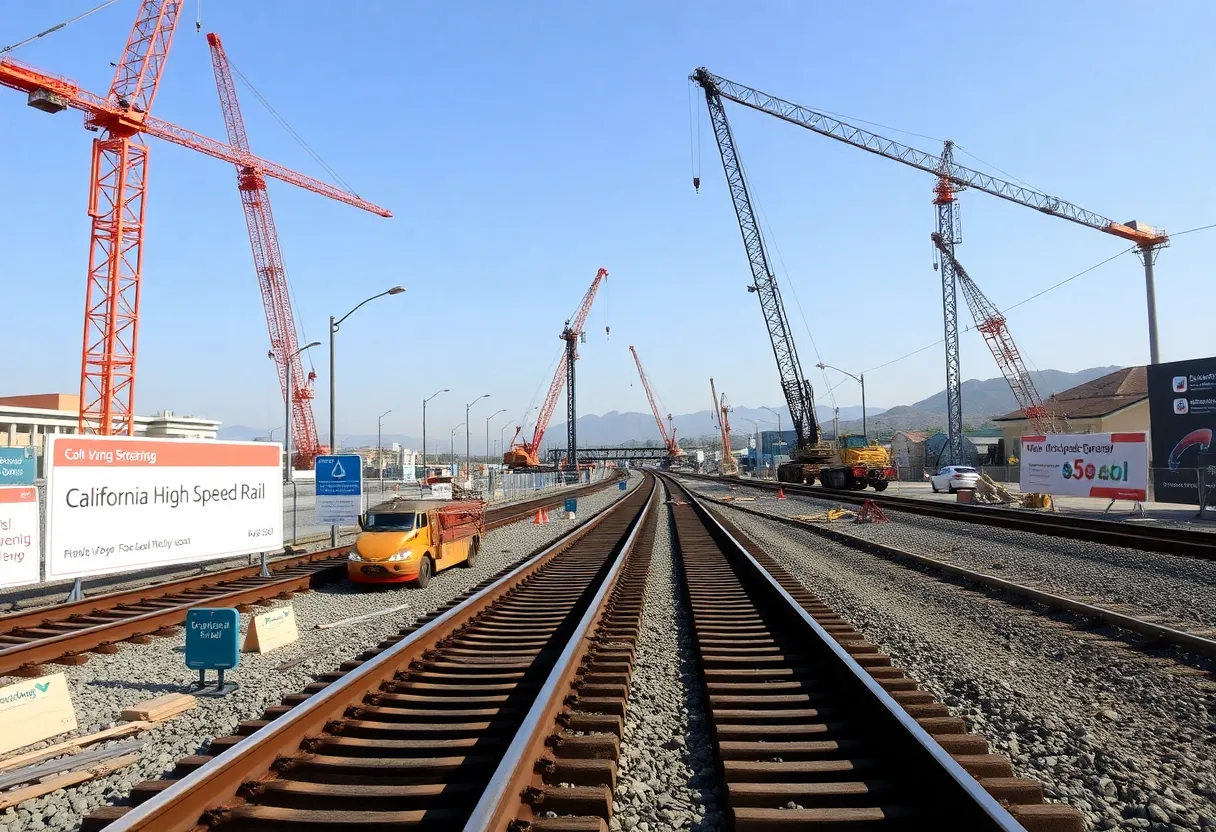News Summary
The Trump administration has withdrawn $4 billion in federal funding from California’s high-speed rail project, which has faced 16 years of delays and increased costs. Transportation Secretary Sean Duffy criticized the project for its inefficiency, while California officials argue that progress has been made despite the funding termination. Governor Gavin Newsom is considering legal action against the decision, as the project’s future remains uncertain amidst ongoing funding challenges.
Trump Administration Revokes $4 Billion in Funding for California High-Speed Rail Project
In a significant turn of events, the Trump administration has pulled $4 billion in federal funds allocated for California’s troubled high-speed rail project. This decision comes as the project faces ongoing criticisms, years of delays, and ballooning costs, leaving state officials scrambling to respond.
Project Delays and Cost Overruns Cited
The Federal Railroad Administration cited numerous reasons for the termination of funding, highlighting 16 years of project delays, persistent cost overruns, and the striking fact that not a single mile of high-speed track has been completed. The California High-Speed Rail project, initially approved by voters in 2008, was designed to connect San Francisco and Los Angeles, with hopes of reducing travel time significantly. Unfortunately, it has become a symbol of inefficiency in public projects, as costs have skyrocketed from an original projection of $33 billion to estimates reaching $128 billion.
Labeling the Project a ‘Train to Nowhere’
Transportation Secretary Sean Duffy has gone as far as to label the high-speed rail initiative a “train to nowhere,” criticizing California state officials for purportedly enabling mismanagement. Less than 25% of the project’s funding has come from federal sources, mainly relying on state funds and a voter-approved bond.
California’s Response to Funding Withdrawal
In the wake of the funding withdrawal, California officials are adamant that the federal funding agreements are legally binding. They argue that substantial progress has been made on the project, with more than 50 structures, including bridges and underpasses, reportedly completed. Governor Gavin Newsom has condemned the federal action as “illegal” and has vowed to explore all avenues to contest the decision, including potential legal challenges.
Future of the High-Speed Rail Project Uncertain
The California High-Speed Rail Authority intends to release a revised funding plan and timeline later this summer, as the project continues to seek private investment. Currently, there is a projected funding gap of $7 billion needed to build a crucial segment between Merced and Bakersfield. Additionally, Newsom’s administration is considering extending the state’s cap-and-trade program, which serves as a key funding source for the rail project, through 2045.
Potential Review of Other Grants
Secretary Duffy has indicated that other grants related to the project could be subject to review for potential clawbacks, raising further concerns among state officials and supporters of the rail initiative. Critics within California’s Democratic party have pointed out issues surrounding fiscal responsibility, questioning the overall feasibility of the high-speed rail endeavor.
No Progress on High-Speed Track
The absence of any laid track since the project’s inception remains a stark reality, with comprehensive reports underscoring significant mismanagement and cost overruns. Although the project aims to drastically cut travel time to under three hours between Los Angeles and San Francisco—compared to the current five to seven hours it takes by car—the path to fulfilling this vision remains murky.
Conclusion: Ongoing Tensions
The funding decision has further strained the already tense relationship between federal and state officials amidst a broader political rivalry. Despite earlier optimism from Newsom’s administration that the project was entering its final construction phase, the ongoing funding hurdles suggest that the California high-speed rail project still has a long road ahead before it can become a reality.
Deeper Dive: News & Info About This Topic
Construction CA Resources
Trump Administration Cancels Funding for California High-Speed Rail
Trump Administration Cuts Funding for California High-Speed Rail Project
Paving the Way: Smart Road Construction in the Connected Era
California Governor Gavin Newsom Revamps Environmental Quality Act
Brightline West Project Advances toward Construction
Brightline West Starts Field Investigations for High-Speed Rail
Additional Resources
- Fox Business
- The Guardian
- Washington Post
- Los Angeles Times
- AP News
- Wikipedia: High-speed rail in the United States
- Google Search: California high-speed rail project
- Google Scholar: California high-speed rail
- Encyclopedia Britannica: High-speed rail
- Google News: California high-speed rail funding
Author: Construction CA News
The CALIFORNIA STAFF WRITER represents the experienced team at constructioncanews.com, your go-to source for actionable local news and information in California and beyond. Specializing in "news you can use," we cover essential topics like product reviews for personal and business needs, local business directories, politics, real estate trends, neighborhood insights, and state news affecting the area—with deep expertise drawn from years of dedicated reporting and strong community input, including local press releases and business updates. We deliver top reporting on high-value events such as the Rose Parade, Coachella, Comic-Con, and the California State Fair. Our coverage extends to key organizations like the California Building Industry Association and Associated General Contractors of California, plus leading businesses in technology and entertainment that power the local economy such as Apple and Alphabet. As part of the broader network, including constructionnynews.com, constructiontxnews.com, and constructionflnews.com, we provide comprehensive, credible insights into the dynamic landscape across multiple states.


